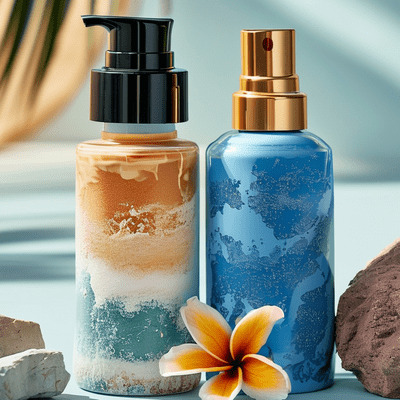 ISO 24444 / ISO 24443
ISO 24444 / ISO 24443 EU COLIPA and SANS 1557 Verified Broadspectrum Sunscreens

When it comes to sun protection, the choice between mineral and chemical sunscreens can be confusing. Both types offer effective UV protection, but they work in fundamentally different ways and come with their own sets of advantages and disadvantages. This guide will help you understand the key differences between mineral and chemical sunscreens, enabling you to make an informed decision for your skin care needs.
Also known as physical sunscreens, these products create a physical barrier on your skin. They contain active mineral ingredients, typically zinc oxide and/or titanium dioxide, which sit on top of the skin and reflect or scatter UV rays away from the body.
These sunscreens work by absorbing UV rays. They contain organic (carbon-based) compounds such as oxybenzone, avobenzone, octisalate, and octocrylene, which penetrate the skin and absorb UV rays, converting them into heat which is then released from the body.

For individuals with sensitive skin or those prone to allergies, mineral sunscreens are often the safer choice. The physical nature of mineral sunscreens means they're less likely to cause skin irritation or allergic reactions. Chemical sunscreens, on the other hand, can sometimes cause stinging, especially around the eyes, or lead to allergic reactions in some individuals.
In recent years, the environmental impact of sunscreens has become a significant concern. Some chemical sunscreen ingredients, particularly oxybenzone and octinoxate, have been shown to contribute to coral bleaching and harm marine ecosystems. As a result, mineral sunscreens are often considered more environmentally friendly and are frequently labeled as "reef-safe."
Chemical sunscreens typically have a thinner consistency and are easier to apply, especially under makeup. They're often preferred for daily use because they don't leave a white cast. Mineral sunscreens, while improving in formulation, can still be thicker and may leave a slight white residue, especially on darker skin tones. However, many brands now offer tinted mineral sunscreens to address this issue.
Both mineral and chemical sunscreens can provide excellent protection when used correctly. Mineral sunscreens offer immediate protection, while chemical sunscreens need about 20 minutes to become fully effective. Mineral sunscreens are often considered more stable in direct UV light, but chemical sunscreens can offer longer-lasting protection, especially during water activities.
The best sunscreen for you depends on your individual needs, skin type, and lifestyle. Consider these key factors when making your decision:
Regardless of which type you choose, the most important factor is consistent use. The best sunscreen is the one you'll use regularly and correctly. Remember to apply generously, reapply every two hours or after swimming or sweating, and use other sun protection measures like protective clothing and seeking shade during peak sun hours.
At Koola Sun, we understand that different skin types and activities require different sunscreen formulations. That's why we offer both mineral and chemical sunscreen options to meet all your sun protection needs:
Koola Sun's mineral sunscreens use high-quality zinc oxide and titanium dioxide to provide excellent broad-spectrum protection with minimal environmental impact. Our formulations are designed to minimize white cast while maximizing protection, making them suitable for all skin types, including sensitive skin.
For those who prefer a lightweight, easy-to-apply formula, our chemical sunscreens offer excellent protection with a silky, invisible finish. We've selected the most effective and least irritating active ingredients to ensure broad-spectrum protection with minimal skin sensitivity issues.
Our sun protection specialists can help you determine which sunscreen type is best for your specific needs, skin type, and activities. Contact us for personalized recommendations: